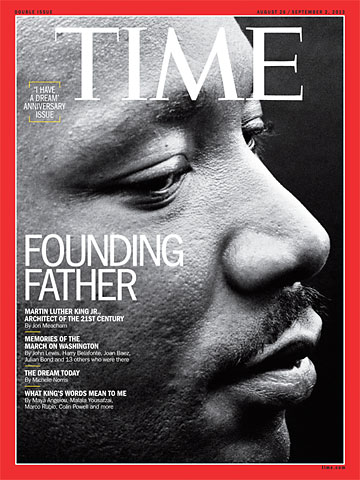
(2 of 6)
Fifty years on, no matter where one stands on the political spectrum, it's all too easy to be glib about the meaning of the March on Washington and the movement's victories: the 1964 Civil Rights Act and the 1965 Voting Rights Act. For some conservatives, the civil rights movement belongs to a kind of antiquity. In striking down a key section of the 1965 voting-rights legislation (a bill consistently renewed by Congress, including as recently as 2006 for an additional 25 years), Chief Justice John Roberts wrote that "our country has changed" and that the discriminatory world where African Americans were blocked from the ballot box no longer exists. On the other extreme, there are liberals who believe that racial progress has been so glacial--never mind gradual--that the shooting of a young man like Trayvon Martin (and the subsequent acquittal of his killer) is all too often the rule rather than the exception in America.
The prevailing reality--and a crucial legacy--of King's speech to the nation 50 Augusts ago may have been best captured this summer, in the wake of the Martin verdict, when a particular African American calmly enumerated the daily acts of racism that still shape our national life. "There are very few African-American men in this country who haven't had the experience of being followed when they were shopping in a department store. That includes me. And there are very few African-American men who haven't had the experience of walking across the street and hearing the locks click on the doors of cars. That happens to me, at least before I was a Senator. There are very few African Americans who haven't had the experience of getting on an elevator and a woman clutching her purse nervously and holding her breath until she had a chance to get off. That happens often."
A gloomy report. And yet, and yet: the black man making these observations in the James Brady Briefing Room of the White House was the 44th President of the United States, Barack Obama, who was a toddler when Martin Luther King Jr. stepped up to the podium at the march in 1963.
The most obvious observation about life since August 1963 is also the most accurate: we have traveled far, but not far enough. Revisiting King's speech, the religiously infused culture from which it sprang and the political moment in which he delivered it suggests that he, for one, wouldn't be especially surprised by the ambivalent state of affairs in the America of 2013. Like our more familiar founders (Washington, Adams, Hamilton, Jefferson), he was a practical idealist, a man who could articulate an ideal but knew that human progress, while sometimes intoxicatingly rapid, tends to be a provisional enterprise. The march, he said that day in Washington, was not an end; it was but a beginning. We live in a world King helped create. We do not yet live in the world he helped all of us dream of.
